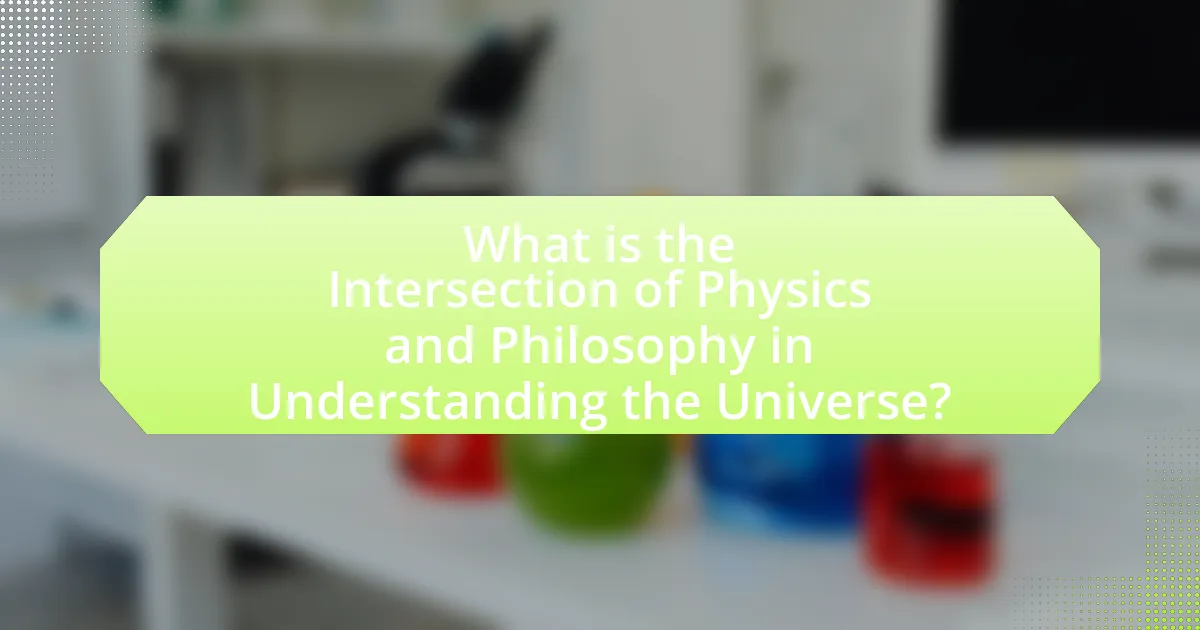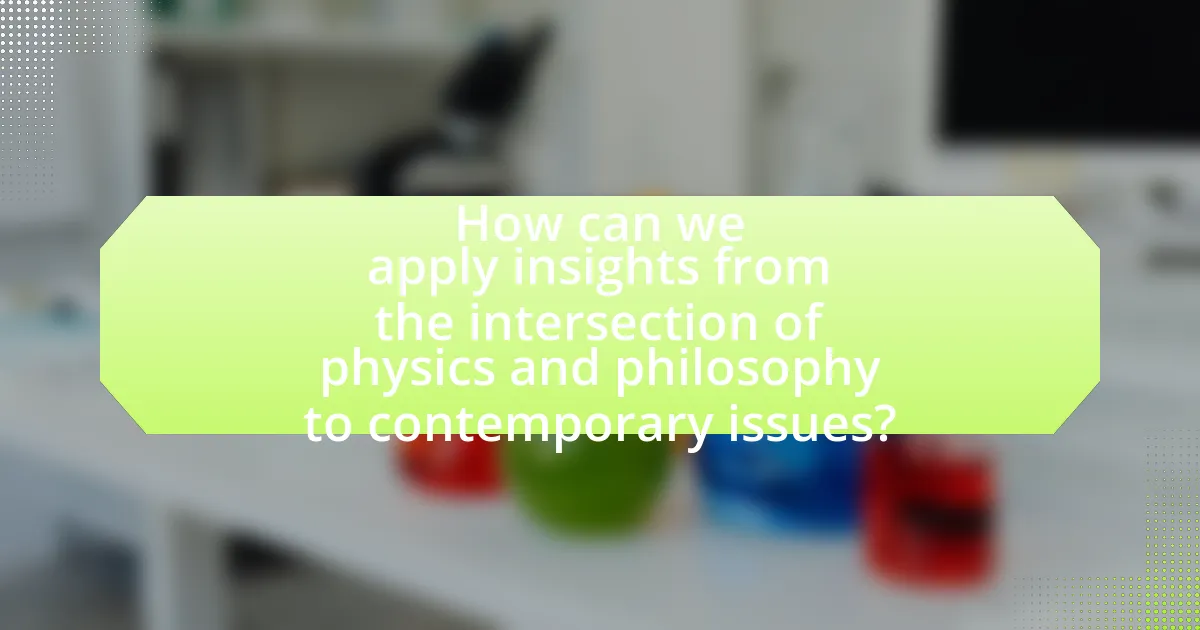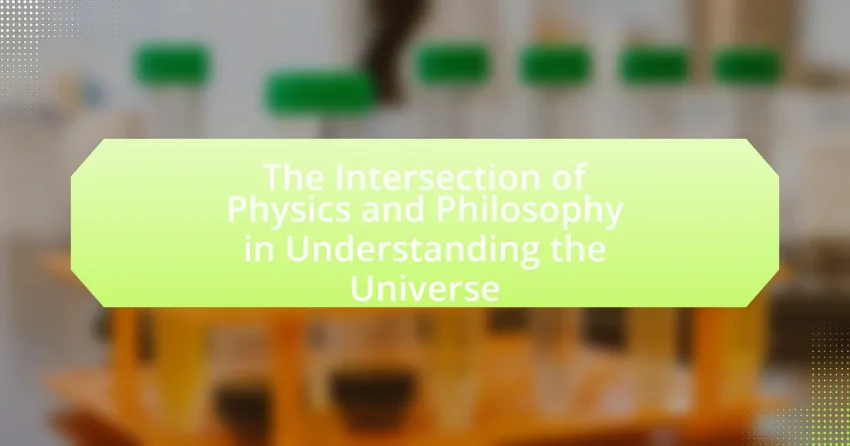The article explores the intersection of physics and philosophy in understanding the universe, highlighting how both disciplines address fundamental questions about existence, reality, and the nature of the cosmos. It examines the complementary roles of physics, which provides empirical data and theories, and philosophy, which critically analyzes the implications of these theories. Key topics include the philosophical implications of quantum mechanics, the nature of time and space, and the ethical considerations arising from advancements in cosmological research. The article emphasizes the significance of this interdisciplinary approach for enhancing scientific inquiry, informing public discourse, and fostering collaboration between physicists and philosophers.

What is the Intersection of Physics and Philosophy in Understanding the Universe?
The intersection of physics and philosophy in understanding the universe lies in their shared quest to explain fundamental questions about existence, reality, and the nature of the cosmos. Physics provides empirical data and theories, such as quantum mechanics and relativity, which describe the behavior of matter and energy, while philosophy critically examines the implications of these theories, addressing questions about causality, the nature of time, and the concept of reality itself. For instance, the philosophical implications of quantum entanglement challenge traditional notions of locality and causation, prompting debates about determinism and free will. This interplay enriches both disciplines, as philosophical inquiry can guide scientific exploration, and scientific discoveries can reshape philosophical perspectives.
How do physics and philosophy complement each other in this context?
Physics and philosophy complement each other in understanding the universe by providing a framework for interpreting empirical data and addressing fundamental questions about existence. Physics offers quantitative models and theories, such as quantum mechanics and relativity, which describe the behavior of matter and energy. Philosophy, on the other hand, explores the implications of these theories, questioning the nature of reality, causality, and the limits of human knowledge. For instance, the philosophical implications of quantum entanglement challenge traditional notions of locality and causation, prompting discussions about determinism and free will. This interplay allows for a deeper exploration of concepts that physics alone cannot fully address, thereby enriching our comprehension of the universe.
What fundamental questions do both disciplines seek to answer about the universe?
Both physics and philosophy seek to answer fundamental questions about the nature of the universe, including the origins of existence, the nature of reality, and the laws governing the cosmos. Physics investigates these questions through empirical evidence and mathematical models, while philosophy explores the implications and meanings behind these concepts. For instance, both disciplines ponder the question of why the universe exists at all, a topic that has been debated since ancient times and remains a central inquiry in both fields. Additionally, they examine the nature of time and space, with physics providing theories such as relativity, and philosophy questioning the implications of these theories on human perception and understanding.
How do the methodologies of physics and philosophy differ in exploring the universe?
The methodologies of physics and philosophy differ significantly in their approaches to exploring the universe. Physics relies on empirical evidence, experimentation, and mathematical modeling to formulate theories about the physical world, as seen in the scientific method where hypotheses are tested through observation and experimentation. In contrast, philosophy employs critical analysis, logical reasoning, and conceptual exploration to address fundamental questions about existence, knowledge, and reality, often without the need for empirical validation. For example, while physicists may use data from telescopes to understand cosmic phenomena, philosophers might engage in discussions about the implications of those phenomena on concepts like time and space. This distinction highlights how physics seeks to explain the universe through quantifiable data, whereas philosophy seeks to understand the underlying principles and meanings that govern our interpretation of that data.
Why is the intersection of these fields significant for our understanding of reality?
The intersection of physics and philosophy is significant for our understanding of reality because it allows for a comprehensive exploration of fundamental questions regarding existence, knowledge, and the nature of the universe. Physics provides empirical data and theories about the physical world, such as the laws of motion and quantum mechanics, while philosophy offers critical analysis and conceptual frameworks to interpret these findings. For instance, the philosophical implications of quantum mechanics challenge traditional notions of determinism and causality, prompting deeper inquiries into the nature of reality itself. This synergy fosters a more nuanced understanding of complex phenomena, as seen in discussions surrounding the nature of time and space, which are informed by both scientific theories and philosophical inquiry.
What insights can philosophy provide to the interpretations of physical theories?
Philosophy provides critical insights into the interpretations of physical theories by examining foundational concepts such as causality, reality, and the nature of scientific explanation. For instance, philosophical analysis helps clarify the implications of quantum mechanics, particularly regarding the observer effect and the nature of reality, as discussed by physicist Niels Bohr and philosopher Werner Heisenberg. Additionally, philosophy addresses the limits of scientific knowledge, as seen in Karl Popper’s falsifiability criterion, which emphasizes that scientific theories must be testable and refutable. This philosophical perspective encourages a deeper understanding of the assumptions underlying physical theories, fostering a more nuanced interpretation of scientific findings.
How does physics challenge philosophical concepts of existence and knowledge?
Physics challenges philosophical concepts of existence and knowledge by providing empirical evidence that often contradicts traditional metaphysical views. For instance, quantum mechanics introduces phenomena such as superposition and entanglement, which defy classical notions of reality and locality, suggesting that particles can exist in multiple states simultaneously and be interconnected regardless of distance. This challenges the philosophical idea of an objective reality that can be fully known and understood through reason alone. Additionally, the theory of relativity alters the perception of time and space, indicating that they are not absolute but relative to the observer’s frame of reference, which raises questions about the nature of existence itself. These scientific advancements compel philosophers to reconsider the foundations of knowledge, as they reveal limitations in human understanding and the potential for multiple interpretations of reality.

What are the key philosophical questions raised by modern physics?
Modern physics raises several key philosophical questions, primarily concerning the nature of reality, the role of the observer, and the implications of quantum mechanics. One significant question is whether reality exists independently of observation, as suggested by interpretations of quantum mechanics, which imply that particles exist in a superposition of states until measured. This challenges classical notions of an objective reality.
Another critical question involves determinism versus free will, particularly in light of theories like chaos theory and quantum indeterminacy, which suggest that not all events are predetermined. Additionally, the concept of time is questioned, especially in relativity, where time is not absolute but relative, leading to inquiries about the nature of time itself and its flow.
Furthermore, the implications of theories such as string theory and the multiverse hypothesis raise questions about the uniqueness of our universe and the nature of existence. These philosophical inquiries are essential for understanding the broader implications of modern physics on our conception of the universe and our place within it.
How does quantum mechanics influence philosophical thought?
Quantum mechanics significantly influences philosophical thought by challenging traditional notions of reality, causality, and determinism. The principles of superposition and entanglement, for instance, suggest that particles can exist in multiple states simultaneously and that their properties can be interconnected regardless of distance, which raises questions about the nature of existence and the limits of human knowledge. Philosophers like Niels Bohr and Werner Heisenberg have argued that the act of observation affects the observed phenomenon, leading to discussions about the role of the observer in defining reality. This has prompted a reevaluation of concepts such as free will and the nature of truth, as seen in the works of contemporary philosophers like David Deutsch, who explore the implications of quantum theory on epistemology and metaphysics.
What implications does quantum entanglement have for our understanding of reality?
Quantum entanglement suggests that particles can be interconnected in ways that challenge classical notions of separateness and locality, implying a fundamental interconnectedness in reality. This phenomenon indicates that the state of one particle can instantaneously affect the state of another, regardless of the distance separating them, which contradicts classical physics principles. Experiments, such as those conducted by Alain Aspect in the 1980s, have demonstrated that entangled particles exhibit correlations that cannot be explained by local hidden variables, reinforcing the idea that reality may not be as deterministic and independent as previously thought. This challenges our understanding of causality and suggests that the universe may operate on principles that transcend classical logic, prompting philosophical inquiries into the nature of reality itself.
How does the observer effect challenge traditional notions of objectivity?
The observer effect challenges traditional notions of objectivity by demonstrating that the act of observation can alter the state of a system being observed. In quantum mechanics, for instance, particles such as electrons exhibit different behaviors when measured, indicating that the observer’s presence influences the outcome. This phenomenon undermines the idea that objective reality exists independently of observation, as shown in experiments like the double-slit experiment, where particles behave as both waves and particles depending on whether they are observed. Thus, the observer effect reveals that knowledge and reality are intertwined, complicating the pursuit of absolute objectivity in scientific inquiry.
What role does cosmology play in philosophical discussions about the universe?
Cosmology plays a crucial role in philosophical discussions about the universe by providing a scientific framework that informs metaphysical inquiries. This scientific discipline explores the origins, structure, and evolution of the universe, which raises fundamental questions about existence, time, and the nature of reality. For instance, the Big Bang theory, a cornerstone of modern cosmology, prompts philosophical debates regarding causality and the nature of beginnings. Additionally, concepts such as the multiverse challenge traditional notions of uniqueness and reality, leading philosophers to reconsider ideas about existence and the nature of knowledge. Thus, cosmology not only enriches philosophical discourse but also shapes the questions philosophers ask about the universe.
How do theories of the Big Bang and the multiverse affect philosophical perspectives on creation?
Theories of the Big Bang and the multiverse significantly influence philosophical perspectives on creation by challenging traditional notions of a singular, divine act of creation. The Big Bang theory posits that the universe originated from an extremely hot and dense state approximately 13.8 billion years ago, suggesting a naturalistic explanation for the universe’s existence rather than a purely supernatural one. This scientific framework prompts philosophers to reconsider the implications of a universe that may not require a creator, as it can be viewed as a self-contained system governed by physical laws.
In addition, the multiverse theory, which proposes the existence of multiple, perhaps infinite, universes, further complicates the philosophical discourse on creation. If our universe is just one of many, the uniqueness of our existence is called into question, leading to discussions about the nature of reality and existence itself. Philosophers like David Deutsch argue that the multiverse challenges the idea of a singular purpose or design in creation, suggesting instead that existence could be a product of random processes across countless universes.
These theories collectively encourage a shift from theistic interpretations of creation to more agnostic or atheistic viewpoints, as they provide frameworks that do not necessitate a divine creator. The implications of these scientific theories thus extend beyond physics, prompting profound philosophical inquiries into the nature of existence, purpose, and the origins of the universe.
What ethical considerations arise from advancements in cosmological research?
Advancements in cosmological research raise several ethical considerations, primarily concerning the implications of scientific discoveries on humanity and the universe. One significant ethical concern is the potential for misuse of knowledge, such as the development of technologies that could alter cosmic phenomena or impact planetary systems, which could lead to unintended consequences for Earth and its inhabitants. Additionally, the exploration of the universe raises questions about the ownership of cosmic resources and the rights of future generations to access these resources.
Furthermore, the pursuit of knowledge in cosmology can lead to existential risks, as understanding the universe’s fate may provoke anxiety or nihilism among individuals and societies. Ethical considerations also include the responsibility of scientists to communicate their findings accurately and to engage with the public about the implications of their research, ensuring that societal values are considered in scientific discourse. These concerns highlight the need for a framework that balances scientific advancement with ethical responsibility, ensuring that cosmological research benefits humanity without compromising ethical standards.

How can we apply insights from the intersection of physics and philosophy to contemporary issues?
Insights from the intersection of physics and philosophy can be applied to contemporary issues by fostering a deeper understanding of concepts such as reality, causality, and the nature of existence. For instance, the philosophical implications of quantum mechanics challenge traditional notions of determinism and encourage discussions about free will, which can inform ethical decision-making in technology and artificial intelligence. Additionally, philosophical inquiries into the nature of time and space, as explored in relativity, can influence debates on climate change and resource management by emphasizing the interconnectedness of systems over time. These applications demonstrate how integrating philosophical perspectives with scientific insights can lead to more holistic approaches to pressing global challenges.
What are the practical implications of understanding the universe through both lenses?
Understanding the universe through both physics and philosophy leads to practical implications such as enhanced scientific inquiry and improved ethical frameworks. The integration of empirical data from physics with philosophical reasoning fosters a more comprehensive approach to complex questions about existence, reality, and the nature of knowledge. For instance, the philosophical implications of quantum mechanics challenge traditional notions of determinism, prompting scientists to reconsider the foundational principles of causality and free will. This interdisciplinary dialogue can inform policy-making, particularly in areas like technology ethics and environmental sustainability, where scientific advancements must align with ethical considerations. By bridging these two fields, society can cultivate a more nuanced understanding of the universe that informs both scientific progress and moral responsibility.
How can this interdisciplinary approach inform scientific education and public discourse?
An interdisciplinary approach that combines physics and philosophy can significantly enhance scientific education and public discourse by fostering critical thinking and a deeper understanding of complex concepts. This integration encourages students and the public to explore not only the empirical aspects of scientific inquiry but also the ethical, metaphysical, and epistemological implications of scientific theories. For instance, discussions around quantum mechanics often raise philosophical questions about determinism and reality, prompting learners to engage with both scientific principles and philosophical reasoning. Research by physicist David Deutsch highlights that philosophical inquiry can lead to a more profound comprehension of scientific theories, thereby enriching educational curricula and public discussions. This approach ultimately cultivates a more informed and reflective society capable of engaging with the implications of scientific advancements.
What strategies can be employed to foster collaboration between physicists and philosophers?
To foster collaboration between physicists and philosophers, interdisciplinary workshops and conferences can be organized to facilitate dialogue and exchange of ideas. These events allow both groups to present their perspectives on fundamental questions, such as the nature of reality and the implications of quantum mechanics. For instance, the annual “Philosophy of Science Association” meetings have successfully brought together scientists and philosophers to discuss overlapping interests, demonstrating the effectiveness of structured interactions. Additionally, joint research projects can be initiated, where physicists and philosophers collaboratively explore topics like the interpretation of scientific theories, thereby creating a shared framework for inquiry. This approach has been exemplified by initiatives like the “Foundational Questions Institute,” which funds projects that bridge the gap between physics and philosophy, highlighting the potential for productive collaboration.
What best practices can be adopted for exploring the intersection of physics and philosophy?
To explore the intersection of physics and philosophy effectively, one should adopt an interdisciplinary approach that integrates empirical research with philosophical inquiry. This involves engaging with both scientific literature and philosophical texts to understand the foundational questions and implications of physical theories. For instance, examining the philosophical implications of quantum mechanics, as discussed by physicists like Niels Bohr and philosophers like Werner Heisenberg, can illuminate the nature of reality and observation. Additionally, fostering dialogue between physicists and philosophers through conferences and collaborative research can enhance mutual understanding and generate new insights. This practice is supported by historical examples, such as the discussions surrounding relativity and its philosophical ramifications, which have shaped contemporary thought in both fields.
How can individuals engage with both disciplines to enhance their understanding of the universe?
Individuals can engage with both physics and philosophy by studying the foundational principles of each discipline and exploring their interconnections. For instance, individuals can read works by physicists like Albert Einstein and philosophers like Immanuel Kant to understand how scientific theories and philosophical inquiries shape our comprehension of reality. Engaging in discussions, attending interdisciplinary seminars, and participating in online courses that focus on the philosophy of science can further enhance this understanding. Research shows that interdisciplinary approaches foster critical thinking and a deeper grasp of complex concepts, as evidenced by studies highlighting the benefits of integrating philosophical inquiry into scientific education.
What resources are available for further exploration of this interdisciplinary field?
Key resources for further exploration of the intersection of physics and philosophy include academic journals, books, and online courses. Notable journals such as “Studies in History and Philosophy of Science” and “Philosophy of Science” publish articles that bridge these disciplines. Influential books like “The Philosophy of Physics” by Lawrence Sklar and “Philosophy of Quantum Mechanics” by Roland Omnès provide foundational insights. Additionally, platforms like Coursera and edX offer courses that explore philosophical implications of physical theories, enhancing understanding of this interdisciplinary field.
